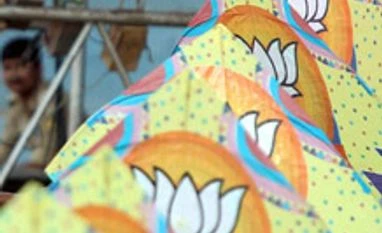BJP may emerge largest party in hung parliament: Edelweiss
Party may find post-poll alliances easier; caste crucial factor 50% of seats
BS Reporter New Delhi The Bharatiya Janata Party (BJP) is likely to emerge as the single largest party winning between 145-155 seats in the 2014 general elections which may throw up yet another hung parliament, leading domestic brokerage Edelweiss Securities predicted in a detailed report titled Poll 2014: Tracing the fault lines.
“The party could consolidate its core constituency— upper castes, middle class, urban, educated voters. Gains are likely to accrue in UP, MP, Gujarat, Rajasthan, among others,” Edelweiss said. In 2009, BJP had won 116 seats as against Congress’s 206.
“If BJP emerges as the largest party, it may get the first opportunity to form the government. Getting allies will be challenging for the party, but as post-poll alliances are less ideological, it may manage to form the government. In another scenario, if INC’s seat tally is lower than 2004, it may decide not to stake a claim to power and instead decide to support a Third Front coalition from outside,” the report authored by analysts Nischal Maheshwari, Kapil Gupta, Toshi Jain and Prateek Parekh said.
The analysts had studied the trends in 10 large states which account for 399 seats or 73% of the Lok sabha. They found caste was a dominant factor in many of these states. “In our study, we find that voting patterns clearly exhibit caste-based voting in more than 50% of Lok Sabha constituencies, big states being UP, Bihar, AP, Karnataka, among others. Voting patterns seen below clearly highlight that upper castes lean in favour of BJP; INC is strong among Muslims and it also enjoys support among Dalits, Adivasis and OBCs.”
The other key factors include, pre-poll alliances and electoral cycles. BJP with its limited geographic presence would be reliant on such alliances, says the report, “By getting into pre-poll alliance with regional players, parties can hope to enhance their geographical presence. This is particularly true for BJP, whose presence has been largely limited to northern and central states and has a weak presence in northeast or southern states.”
The report estimated the ruling party to win around 130-140 seats with expected gains in Karnataka and Bihar. “Performance may be weak in Tamil Nadu and West Bengal due to breaking of alliances,” it said.
Regional parties are likely to increase their seat tally. In Tamil Nadu and West Bengal, DMK’s and Trinamool’s split with INC could benefit AIADMK and Left Front, respectively. In UP, we expect SP to be the leader, but not in an emphatic way, owing to the anti-incumbency factor, the analysts said.
In AP, new party YSR Congress could win a decent number of seats, while Telangana issue will benefit the TDP‐TRS alliance. In Bihar, splitting of the BJP-JD(U) alliance will hurt both; however JD(U) is likely to join hands with INC, which will benefit both.
*Subscribe to Business Standard digital and get complimentary access to The New York TimesSubscribeRenews automatically, cancel anytime
Here’s what’s included in our digital subscription plans
Exclusive premium stories online
Complimentary Access to The New York Times

News, Games, Cooking, Audio, Wirecutter & The Athletic
Curated Newsletters

Insights on markets, finance, politics, tech, and more delivered to your inbox
Market Analysis & Investment Insights
Seamless Access Across All Devices










)

